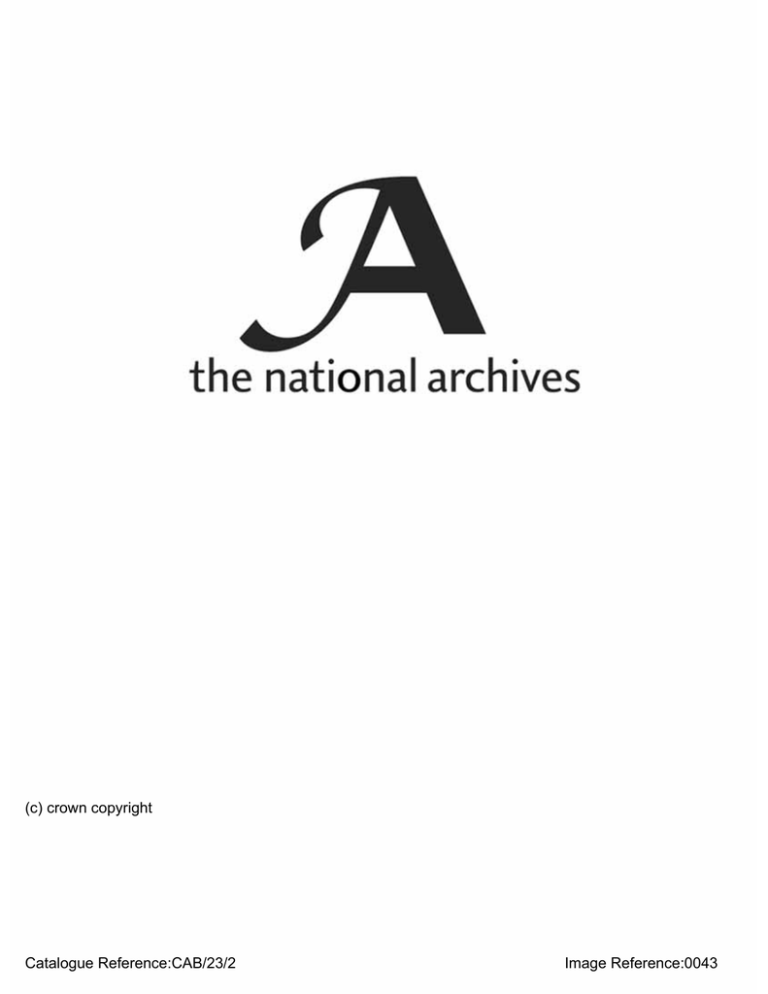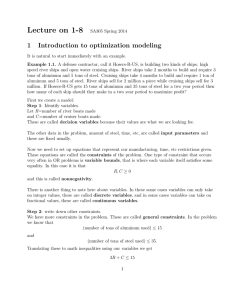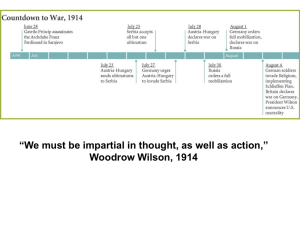(c) crown copyright Catalogue Reference:CAB/23/2 Image Reference:0043
advertisement

(c) crown copyright Catalogue Reference:CAB/23/2 Image Reference:0043 Printed for the War Cabinet April 1917. SECRET. 8 1 W A R CABINET, 125. Minutes of a Meeting held at 10, Downing Street, S.W., on April 23, 1917, at 5 P.M. Present: THE P R I M E MINISTER Hon. the E A R L CCRZON OF KEDLESTON, K G . , G . C . S . I . , G . C . I . E . (in the Chair). The Right The Right Hon. A. BONAR L A W , M . P . The Right Hon. the VISCOUNT MILNER, The Right Hon. A. HENDERSON, M.P. G.C.B., G.C.M.G. The following were also present :The Right Hon. LORD ROBERT CECIL, K . C . , M.P., Minister of Blockade. The Right Hon. S I R J A M E S M A C L A Y , Bt., M.P., S h i p p i n g ControUer. The Right Hon. S I R E. CARSON, K . C . , M.P., First Lord of the Admiralty. S I R L. G . CHIOZZA MONEY, M.P. Admiral Mr. GRAEME THOMSON. S I R J . R. JELLICOE, O.M., G.C.V.O., First Sea Lord. G.C.B., The R i g h t Hon. C. ADDISON, M.D., M.P., Minister of Munitions. The Right Hon. LORD DEVONPORT, Food Controller. SIR HENRY REW, Secretary of Food. K.C.B., Permanent The R i g h t Hon. S I R A. STANLEY, President of the Board of Trade. M.P., S I R R. H. BRADE, K.C.B., Secretary, W a r Office. Mr. U . F . WINTOUR, C.M.G. SIR H. BABINGTON S M I T H , K . C . B . , C.S.I. Mr. J . F . BEALE, Secretary, W h e a t Coramission. Professor W . G. A D A M S . Lieutenant-Colonel S I R M. P. A. HANKEY, K . C . B . , Fleet Paymaster P . H . R o w , R.N., Assistant Captain CLEMENT JONES, Assistant Secretary. Secretary. Secretary. Submarine Menace and Food Supply. 1. THE W a r Cabinet bad under consideration a Report b y First Sea Lord of the Admiralty (G.T.-519) (Appendix I ) , relative to the submarine menace and the food supply, in which their attention was particularly drawn to the following points :— s t n e (a.) The increasingly heavy losses of our merchant ships b y mine and submarine attack. (b.) The necessity for the provision of patrol vessels, &c. (c.) The failure of the existing type of mine to prevent the egress of the German submarines from their bases. (d.) The necessity, Avhilst we possess the shipping required for the purpose, to build u p such a reserve of food in the country as will enable the population to be fed until the submarine menace can be got under control. (e.) The building of mammoth unsinkable ships so as to ensure our obtaining supplies during the latter part of 1918. Gross Tonnage Available. Shipping Available for Imports. 2. S i r Leo Chiozza Money stated (Appendix II) that the gross tonnage on the registers of the United Kingdom and British Dominions on the 1st J a n u a r y , 1917, was 16,788,000 tons ; that on the 1st May it would approximate to 15,467,000 tons ; and that by the end of 1917 it might be estimated, after making an ample allowance for war losses, losses by war damage and marine losses, at 12,862,000 tons. He further stated that in this estimate he had made the necessary allowance for new construction, ships purchased, and for damaged ships repaired, and that he had arrived at the conclusion that, if the present tonnage (8,050,000 tons) appropriated for the use of the Navy and Army and that retained abroad for other reasons remained as at present, the total tonnage available for the imports for the United Kingdom w^ould only amount to 4,812,000 tons on the 31st December, 1917. as against 8,394,000 tons on the 1st J a n u a r y , 1917. The figure given by the First Sea Lord as to the estimated losses approximated to that arrived at by Sir Leo Chiozza Money. The Shipping Controller was of opinion that it would not be safe to count on more than 500,000 tons of extra shipping from the United States of America as an addition to British shipping after taking into account the assistance that they might render from a shipping point of view to the Allies, though such help would mean a corresponding release of our shipping that was now appropriated for Allied requirements. He estimated that there would be eight and a half to ten weeks' supply of wheat in the country at the end of May. Sir Leo Chiozza Money then proceeded to explain to the Cabinet the effect that the reduction of shipping would have on our imports. 3. He stated that on the 1st J a n u a r y , 1917, after m a k i n g the necessary allowances for ships appropriated for War services, & c , and assuming that that remained a constant until the end of the year, we had 8,394,000 tons available for the carriage of imports. On the 31st December, 1917, however, he roughly estimated that the amount would be reduced to only 4,812,000 tons, which meant that, after making an allowance for the cargoes brought in by neutral ships, and also t a k i n g into account the policy of shortened routes which was being adopted, we should by December only be able to import monthly a total of 2,030,000 tons, as against 3,000,000 tons last J a n u a r y . This meant a total reduction of no less than 15,000,000 tons on last y e a r ' s imports. Cereals Kequired. 4. The Food Controller informed the W a r Cabinet that it w a s necessary to import 1,425,000 tons of cereals every month (including 150,000 tons to build u p stocks), which would, on the basis of the import capacity estimated by S i r Leo Chiozza Money, in May only leave approximately the necessary shipping for 800,000 tons of further imports. Army Eequirements. 5. The Director of Contracts, W a r Office, stated that the A r m y requirements amounted to about 428,000 tons a month, but that only about 224,000 of this amount w a s imported into the United Kingdom in unrequisitioned ships, the remainder being discharged direct at the various theatres of w a r abroad. Horses, Mules, and Fodder. 6. With regard to the importation of horses and mules for the W a r Office, the transport required was 8,900 tons of shipping a month. In addition, for the fodder for the horses in all theatres of war, carrying capacity to the extent of 151,000 tons w a s necessary every month. Of this tonnage rather over 90,000 tons per month was req-uired for France. Sir Leo Chiozza Money explained that about 150 merchant ships, with a gross tonnage of 660,000 tons, were employed in connection with the British Expeditionary Force in Salonica. Salonica Shipping Eequirements. Timber. 7. The Director of Timber Supplies stated that the stocks of timber had fallen by 60 per cent, during the past four months, and that there were apparently only three months' supplies in hand. We could, he thought, trust to home production to provide the required amount of pit-wood, except for the collieries of South Wales. B u t the home production of sawn timber w a s exceedingly small compared with the amount which was needed indispensably for war purposes. He instanced the large irreducible consumption in the manufacture of ammunition boxes, only a fifth of which were returned. Munitions. 8. With r e g a r d to the importation of manufactured munitions and iron and manganese ores, & c , the Minister of Munitions pointed out that he proposed to postpone until August next the shipment of 8-inch and 9"2-inch shells from America, which woidd mean a post­ ponement until after A u g u s t of the transport of a total of about 20,000 tons. W i t h regard to the importation of iron-ores, & c , he stated that we received from abroad between 600,000 and 800,000 tons a month, but that he hoped b y next August to b e producing at the rate of some 200,000 additional tons a month from home sources, and had taken steps to alter a large number of foundries so a s to enable them to deal with home productions of ore, which required different treatment from foreign ores. The monthly importations b y the Ministry of Munitions amounted to 1,400,000 tons. ISuddin. pouuaing. v V ^ . ^ ^ ? P M d m g , the Minister of Munitions informed the W a r Cabinet that he h a d made a r r a n g e ­ ments to release almost immediately about 2,500 tons per week and a further amount of about 2,500 tons a week in the near future, alter certain Italian commitments had come to a n end. The Minister of Munitions emphasised the point, however, that increases m steel production depended entirely upon increased supphee of ore, and that our capacity for steel production was at v W i e d t 0 t e e l f r s h i present in excess of the supplies of ore. He stated that Mr. Ford w a s contemplating l a y i n g down in the South of Ireland slips for shiphuilding, and he advocated a large increase generally in this direction in the United Kingdom, a d d i n g that, by utilising four of the existing munition factories, a great deal could he done to increase the.output of marine engines. The Shipping Controller stated that many of the y a r d s were short of labour, but that, as more steel became available, a certain, additional amount could be worked into the ships in spite of the labour difficulty, and that probably another 90,000 men were required to carry out the estimated maximum shipbuilding programme. Cotton, Tobacco, and Fertilisers. Civil Requirements. Mammoth " Unsinkable " Ships. Timber. Airship Sheds. Increase in Shipbuilding. Naval Shipbuilding Programme. 10. The President of the Board of Trade informed the W a r Cabinet that there was enough cotton in the United Kingdom to last four months, and that our imports of this article amounted to approximately 1,000,000 tons per annum. A s r e g a r d s tobacco and fertilisers, we imported annually 70,000 and 400,000 tons respectively. It was stated by S i r Leo Money that the imports required for the civilgpopulation monthly amounted to 553,000 tons. 11. The First Sea Lord of the A d m i r a l t y asked the W a r Cabinet to consider the question of b u i l d i n g mammoth " unsinkable " ships ( W a r Cabinet 117, Minute 16). He stated that he had had designs prepared for a vessel 800 feet long, with a draught of 36 feet, that was practically unsinkable, and had a dead-weight capacity of 40,000 tons. It was estimated by his technical advisers that one or two such ships could be built in a year, and that four or five could be completed in from fifteen to eighteen months. The Shipping Controller added that one such ship was equivalent, as r e g a r d s steel requirements, to eight or nine steamers of 8,000 tons capacity, and that that number of vessels should only take six months to build. 12. As a preliminary to the further restriction of imports, development of shipbuilding, &c, the W a r Cabinet decided that— (a.) After the discharge of timber cargoes now leaded or loading, no further timber should be shipped until the sanction of the W a r Cabinet had been obtained, and that such sanction would not be given until the Department desiring such timber had fully established the urgent necessity for its importation before the W a r C a b i n e t ; (b.) On account of the shortage of steel, the First Lord of the Admiralty should enquire into the strategic aspect of discontinuing the building of airships, so as to save the erection of the sheds required for housing them. (c.) The Shipping Controller, after consultation with certain shipbuilders, should report to the Cabinet at an early date: — (1.) How m a n y more standard merchant ships could be built with the present supply of labour and an increased supply of steel—the extra amount of steel so required being stated. (2.) If the quantity of steel w a s unlimited, what were the additional resources for shipbuilding, and what additional labour would be required to take full advantage of the extra material. (d.) The First Sea Lord should enquire and report as to what effect, if any, the entry of the United States of America into the W a r would have on the Naval Shipbuilding Programme to 1918. Reduction of Army Horses. Civil Requirements. " Unsinkable " Ships. Men-of-war as Wheat Carriers. (e.) The W a r Office should submit a statement showing how a reduction of (a) 25 p e r cent, and, alternatively, (6) 50 per cent, of the number of horses for which they are responsible would, if ordered by the Cabinet, be spread over the various A r m y services, specifying in each case what amount, if any, of light motor transport would be necessary in lieu. (/.) The W a r Office should ascertain and report as soon as possible the number of horses used by the French—for example, on the Western Front—in the units of each of their Army services, and at the same time furnish a statement comparing with these similar numbers i n the British organisation. (g.) The President of the Board of Trade should furnish the W a r Cabinet at an early date with the details of the imports (553,000 tons a month) said to be required for the civil population. (h.) A Meeting should be held at 3 T 5 P.M. on the 24th April, to consider the proposal of the First Sea Lord with regard to the building of mammoth unsinkable merchant ships, and that Lord Pirrie, the First Lord, the First Sea Lord, the Director of Naval Construction, and the Shipping Controller should be invited to attend. 13. The First Sea Lord informed the W a r Cabinet, in reply to their enquiries as to what old men-of-war were available for conversion into wheat carriers in case of the greatest emergency—i.e., our being face to face with starvation—that only a few old battle­ ships were available. The W a r Cabinet requested him further to consider the whole question of the possible utilisation of the old British and Allied warships for the transport of wheat or other commodities, or in the relief of merchant ships now employed for Naval or Military purposes, and report on the subject in due course. 14. The "War Cabinet decided— To resume consideration of this subject at an early date. (Initialled) 2, Whitehall April Gardens, 8.W., 24,. 1917. d. l i . a. APPENDIX I. ft T H E S U B M A R I N E MENACE AND FOOD SUPPLY. (Memorandum by the First Sea Lord.) I T is necessary to call the very serious attention of the W a r Cabinet to the increasingly heavy losses of our merchant ships by mine and submarine attack. It appears quite evident that the situation calls for immediate action and the adoption of such measures as are possible, both to minimise further losses and to ensure such rapidity of construction as will enable us to replace the ships lost with sufficient tonnage to allow of a continuance of the war. The serious nature of the position is best shown by the following figures :— LOSSES between the 1st and the 18th April inclusive. 1 No. ' Gross Tons. British Allied Neutral Total ... ... Total. Mines. Submarines. No. Gross Tons. No. Gross Tons. 70 47 58 229,363 90,399 99,499 175 419,261 65 47 57 218,094 90,399 98,404 5 11,269 1 1,095 169 406,897 6 12,364 1 Comment is Unnecessary in the face of comparison w i t h figures for former months. An even more serious feature of the case is the exceedingly heavy losses that have been reported d u r i n g the l a s t few days, ejg. For the twenty-four hours ending noon, the 20th April, nine British ships, of a total of 27,074 tons, were reported s u n k ; and, in addition, three others were damaged, but are being towed into port. For the twenty-fours ending noon, the 21st April, nine British ships, of a total of 29,705, tons, were reported sunk. It is true that some of the vessels mentioned in these two latter statements were sunk on the 18th April and are therefore included in the total for the period from the 1st to the 18th April, but t h e point to w h i c h I wish particularly to direct attention i s that reports of so l a r g e a number of vessels being sunk have come to hand in two successive periods of twenty-four hours. It is obvious that the continuance of such a rate of loss for even a few days will produce the most serious results. The only immediate remedy that is possible is the provision of as many destroyers and other patrol vessels as can be provided by the United States of America, and A d m i r a l De Chair has been directed to represent to the United States authorities the urgency of the matter ; also Rear-Admiral Sims, of the United States Navy, has, at m y request, sent a telegram couched in strong terms pointing out the g r a v i t y of the situation. ... Until means can be found and provided for a more extended attack on. submerged enemy submarines, the only palliative consists in the provision of a sufficient number of small craft to keep them-submerged, and so cramp their activities. The various methods for attacking submerged submarines in the open sea are by bombs dropped from aircraft, by depth charges dropped from patrol vessels, by paravane attack, and by heavy shell in the nature of depth charges fired by patrol vessels. The three former weapons are already in use to the full extent of our resources. Every possible effort is being made to manufacture and supply howitzers throwing heavy shell to explode under water, but our efforts have been much interfered with by labour strikes, with the result that the supply of these weapons so urgently needed is g r e a t l y delayed. The measures which were 'to a certain extent successful against enemy submarines when surface attacks were common, and which comprised defensive armament of merchant ships, the employment of decoy ships, and the provision of smoke-making apparatus, have all diminished very much in value since the submerged attack b y the submarine became common. The obvious remedy of endeavouring to prevent the egress of submarines from their bases by the use of mines has been carried out to the fullest extent compatible with our supply of mines. Mines are laid i n German waters as fast as they are produced b y the manufacturers, but I have reasons to fear that our present pattern of mine is not satisfactory against s u b m a r i n e s ; otherwise it is hardly credible that, with the l a r g e number that have been laid in the last four months, the losses in submarines would not have been very heavy. The new type of mine, which will undoubtedly be satisfactory against submarines, is only in the early stages of manufacture, and no considerable deliveries will t a k e place before J u l y . There is a period, therefore, until J u l y , during which w e are bound to face most serious losses, and the proper course of action appears to me to be to build up—whilst we still possess the shipping necessary for the purpose—such a reserve of food in this country as will enable the population to be fed when the time arrives—as it surely will—when our shipping will be at a very low ebb, and we shall not have benefited by the use of the German ships now interned in America, or by new tonnage which m a y be produced by America or by this country. There is one further and most important matter to be considered, and that is our supplies for next year. There are two separate and distinct policies in r e g a r d to ship­ b u i l d i n g which we might adopt. The first is to build a very large number of small merchant ships which would be more immune from submerged attack than larger vessels owing to the small target they present, and to the dispersion due to their l a r g e mxmbers ; and, secondly, the provision of a few of the largest ships that can be designed. Ships of this latter type could be made practically unsinkable, and, being few i n number, we could afford sufficient destroyers to escort them through dangerous waters, and so render them safe against submarine or mine attack. The Admiralty have proposed both these alternatives. Neither has been adopted, but instead a type of vessel m i d w a y between the two alternatives—a vessel which is, b y her eize, vulnerable to attack, and is yet so small that large numbers are required, m a k i n g the provision of escort impossible. I am certain that it is essential for the security of the country that some vessels of the largest type should be immediately constructed, and that they should be given priority over everything e l s e ; if this were done, I believe that they would be r u n n i n g by the summer of 1918. A l l considerations as to whether they will be p a y i n g concerns commercially should be swept aside ruthlessly, in view of the danger facing us that a l l the sacrifices w h i c h the country has made may be negatived by the menace of starvation. April 22, 1917. APPENDIX II TABLE ( A ) . BRITISH Steamships of 1,600 Tons Gross and Over: Loss and Gain. Estimate by Sir Leo Ghiozza Losses during Month. Month. Month. Tonnage Tonnage at Beginning Beginning of Month Month.. (a.) 1917. January February March .. April May June July August September.. October November . December . 16,788,000 16,591,000 16,273.000 15,958,000 15,467,000 15,257,000 14,753,000 14,240,000 13,776,000 13,414,000 13,198,000 13,040,000 War Losses. Losses by War ' Damage, Marine Losses. (c.) 186,000 24,000 115,000 2;-6,000 316,000 -94,000 450,000 160,000 475,000 ' 175,000 200,000 500,000 200.000 500,000 200,000 500,000 175,000 450,000 150,000 350,000 150,000 300,000 150,000 300,000 Gains during Month. Total Losses. Tonnag Tonnagee Reduced Reduced by Losses Losses.. Damaged New ConShips struction. Purchased. Ships Repaired. (e,) 34,000 25,000 25,000 10,000 8,000 12,000 6,000 28,000 22,000 8,000 28,000 42,000 Money. 244,000 396,000 435,000 620,000 658,000 712,000 706,000 728,000 647,000 508,000 473,000 492,000 16,544,000 16,195,000 15,838,000 15,338,000 14,809,000 14,545,000 14,047,000 13,512,000 13,129,000 12,906,000 12,725.000 12,548,000 47,000 78,000 112,000 100,000 100,000 100,000 100,000 100,000 100,000 100,000 100,000 100,000 (/-) (.90 8,000 29,000 26,000 22,000 16,000 92,000 18,000 75,000 36,000 - 128,000 45,000 140,000 32,000 160,000 55,000 160,000 54,000 160,000 Total Gains. 47,000 78,000 120,000 129,000 148,000 208,000 193,000 264,000 285,000 292,000 315,000 814,000 Tonnage Tonnage at En End d of Month.. Month 16,591,000 16,273,000 15.958,000 -15,467,000 15,257,000 14,753,000 14,240,000 13,776,000 13,414,000 13,iy8,000 13,040,000 12,862,000 War War Services, Services, Serving Serving Abroad Abroad,, &c &c.. Tonnage Tonnage Remainin Remaining g for for Servic Servicee of Unite United d Kingdom. Kingdom. 8,197,000 7,982,000 8,050,000 8,050,000 8,050,000 8,050,000 8,050,000 8,050,000 8,050,000 8,050,000 8,050,000 8.050.000 8,394,000 8,291.000 7,908,000 7,417,000 7,207,000 6,703,001) 6,190,000 5,726,000 5.364,000 5,148,000 4,990.000 4,812,000 (a.) Thesefiguresinclude ships on Colonial registers which could be brought to home waters, but they exclude such ships as, for physical reasons (e.g., employment on the Great Lakes, shut up in Black Sea, &c), cannot lie so utilised. (b.) Actual figures for January, February, and March ; estimates thereafter. (c.) Actualfiguresfor January, February, and March; estimates thereafter. (rf.) Averagefiguresfor 1915-16. (e.) Estimates (/.) Actual contracts. (g.) It is tentatively assumed that 80 per cent, of the damaged ships come back into use in the fourth month after the report of damage. TABLE ROUGH (B). Estimates of Imports in 1 9 1 7 . By Sir Leo Chiozza (i.) Available Tonnage. Month. (3.) (2.) Tons Cargo, Tons Cargo, dead-weight, dead-weight, Total Imports. brought in by brought in by British Ships. Foreign Ships. (a.) JanuaryJanuaryFebruar Februaryy March March April.. April. . Ma Mayy June Jun e Jul Julyy Augus Augustt September September October October Novembe Novemberr December December 1917 1917.. Totals Total s fo forr 191 19177 8,394,000 8,291,000 7,908,000 7,417,000 7,207,000 6,703,000 6,190,000 5,726,000 5,364,000 5,148,000 4,990,000 4,812,000 .. -- Money. (b.) ' (c.) (5.) Total Imports under Scheme of Shortened Routes. (d.) 2,122,000 2,055,000 2,071,000 1,940,000 1,890,000 1,760,000 1,620,000 1,500,000 1,410,000 1,350,000 1,310,000 1,260,000 878,000 445,000 429,000 400,000 400,000 400,000 350,000 350,000 350,000 350,000 350,000 350,000 3,000,000 2,500,000 2,500,000 2,340,000 2,290,000 2,160,000 1,970,000 1,850,000 1,760,000 1,700,000 1,660,000 1,610,000 3,000,000 2,500,000 2,500,000 2,340,000 2,290,000 2,160,000 2,510,000 2,350,000 2,230,000 2,150,000 2,100,000 2,030,000 20,288,000 5,052,000 25,340,000 28,160,000 (a.) For January, February, and March the figures are nearly correct, but it should be noted that an uncertain quantity of Government imports is excluded. For April and after the figures are proportions based on the available tonnage. (b.) Actual figures (nearly) for January, February, and March ; thereafter the estimates are purely conjectural. (c.) These figures are exclusive of the uncertain quantity of Government imports referred to in note (a), (d.) In this column the imports by British ships are assumed to be increased after June in the proportion of 3 : 4 by reason of shortened voyages. o




